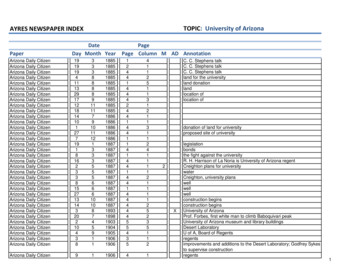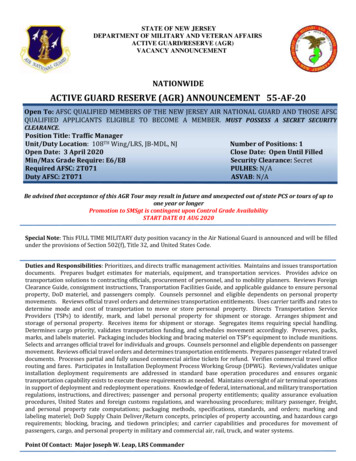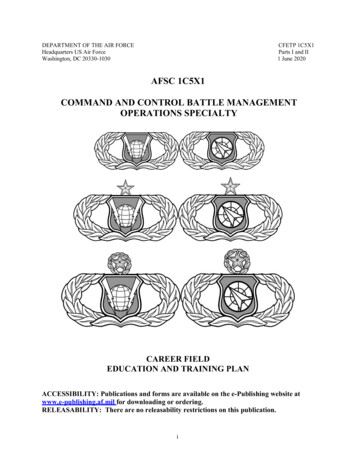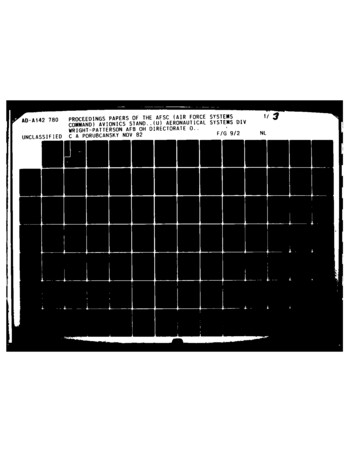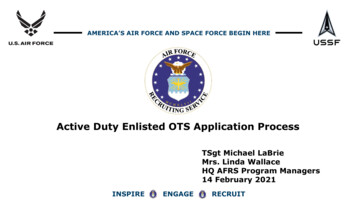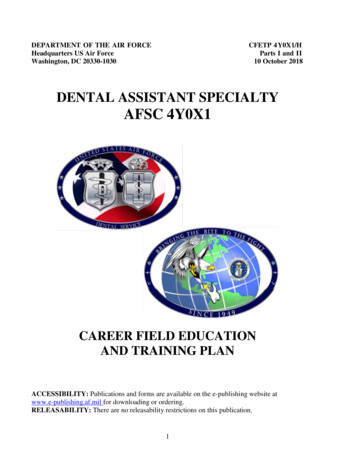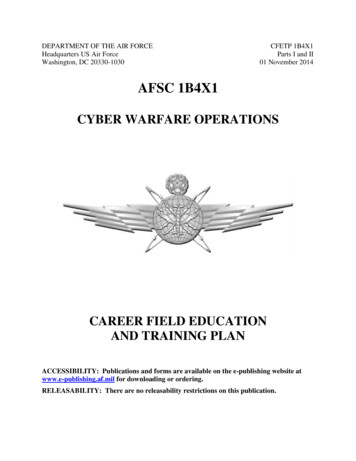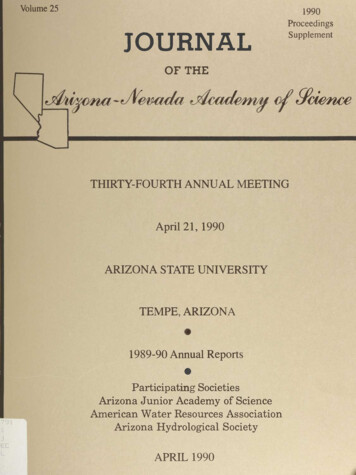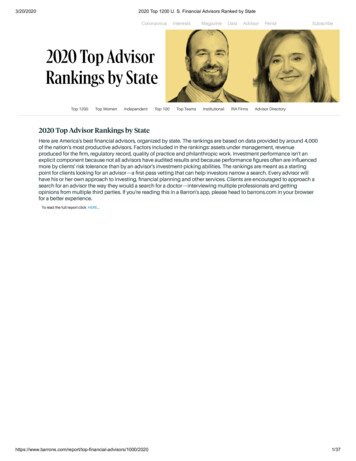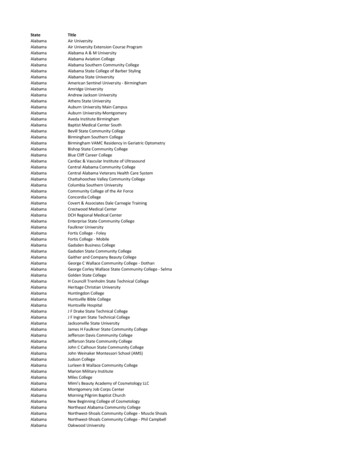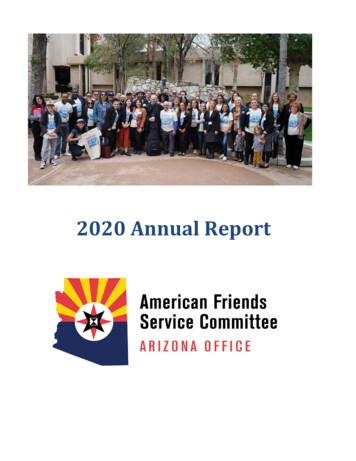
Transcription
2020 Annual Report
Message from the Director:It is the ultimate understatement to say 2020 was a difficult year. Andas with most social problems, those who are most marginalized are themost vulnerable. COVID19 demonstrated this in the starkest of ways,with huge breakouts inside prisons all over the state and devastatingsocial, economic, and health impacts on communities of color.AFSC-Arizona was among the first to sound the alarm about the uniquethreats the virus posed - organizing sign-on letters to the Governor,Corrections, and the Health Department demanding immediate actionto protect people inside. We reached out to networks of incarceratedpeople and their families to collect real-time information about the availability of masks, soap, andprotective equipment inside prisons. We offered family members information on the virus and how to staysafe. When it became clear our state government was refusing to act, we brought people together to dowhat the state would not—collect donations of soap, feminine hygiene products, and toiletries and sentthem to prison units across the state.This response is an expression of the core value of our work:We belong to each other. We take care of each other.No matter who, no matter what.This is the heart of abolition - a radical love that acknowledges the inherent worth and dignity of all people.In the midst of a deadly pandemic, we demonstrated our communities’ capacity for care. When faced withthe stark reality of systemic racism in policing and other systems, we stood in solidarity with worldwideuprisings that affirmed the preciousness of Black lives. In a year of divisive politics, we saw voters turn outin record numbers to call for change to our drug laws.This is the core of our vision for a world without destructive systems of incarceration. We can andwill create a culture in which substance abuse and mental illness are treated instead of punished; whereharm is repaired for all; where accountability means healing, building community; and restoring trust. Thisis the world we all deserve to live in.Please join us in making this vision a reality in 2021. Your generous support helps us respond to theneeds of those most impacted by the current system while cultivating their leadership in creatingsomething better. Thank you for being part of our community of care.With hope and gratitude,Caroline Isaacs, Program DirectorAFSC-Arizona 2020 Annual Reportpg. 1
Expanding Our WorkWe are grateful for the generous support of these foundations:Introducing Enrique - ReFraming Justice OrganizerIn September, we were thrilled to welcome Enrique Olivares-Pelayo as thenew ReFraming Justice Organizer in the Tucson office! Enrique haspreviously worked in Harm Reduction Outreach as a team member of SonoranPrevention Works. His experiences as a formerly incarcerated person livingwith substance use disorder informed his work as an advocate formarginalized people and those impacted by our criminal punishment system.He is currently pursuing a double major in English and Creative Writingthrough the University of Arizona’s Honors College, and is a proud Scholar inthe Ronald E. McNair Achievement Program. Enrique brings his livedexperience and deep understanding of the brokenness of the current system,as well as his vision, passion, and vibrant energy to the work.Responding to COVID19At the outset of the COVID19 pandemic, AFSC-Arizona established twogoals for our work in response to the unique threats of COVID19 in stateprisons:1. Protect people in prison.2. Get people out.We developed a multifaceted strategy to meet these goals. We collecteddocumentation from families and people inside state prisons that basichygiene supplies like soap, disinfectant, and toilet paper were not beingdistributed.In addition to our advocacy efforts to hold the Arizona Department of Corrections accountable and ask theArizona Department of Health Services (ADHS) to intervene, we felt it was important to mirror for peopleinside prison what many in our communities were doing on the outside—sharing resources, offering help,and showing care and concern. Mutual aid is a way for families of incarcerated people and others who careto take concrete action to solve a problem.AFSC-Arizona 2020 Annual Reportpg. 2
Over the course of this campaign, which ran from April 14 through May 13, we delivered to three differentsites a total of:Masks Mandate - #MaskUpAZ #NoExceptionsAn executive order from Governor Ducey on June 17th, lifted the ban on cities and counties from being ableto implement their own local coronavirus restrictions. Within the week, 52 municipalities enacted a maskmandate to protect citizens against the spread of the coronavirus. The Arizona Department of Corrections,however, continued to punish people inside who wore masks.AFSC-Arizona initiated a plan to reach out to the leaders of cities and counties that hosted state prisonfacilities and ask them to pressure ADC to extend the order to include people inside the facilities. A formalletter was written and dispersed to the City Council members, Mayors, and County Boards of Supervisors,on June 23rd, 2020.Using Governor Ducey and the AZDHS’s own logo, we recreated our own to communicate that all peopleshould have the opportunity to protect themselves, especially those who cannot socially distance in prison.We appropriated his hashtag - #MaskUpAZ – and added an additional one to say #NoExceptions, that allpeople in Arizona should have this opportunity.Social Media Image distributed by Arizona GovernmentAFSC-Arizona 2020 Annual ReportSocial Media Image distributed by AFSC-Arizonapg. 3
We received numerous responses over the next week, such as this one, from the Mayor of Goodyear, wherethe Perryville Women’s prison is located:Thank you for reaching out and bringing this issue to the Mayor’s attention. She shares your concern about thehealth and safety of all residents of Goodyear, including the inmates and employees within Perryville State Prison.Unfortunately, the purview to regulate policies at that facility falls to the state. To that end, the Mayor has beenin contact with Governor Ducey’s Office to advocate for the issuance of masks to all of those residing in Perryville.It is our understanding that his office is working to ensure masks become available to all inmates in statefacilities by the end of this week. The Mayor will continue to be diligent to ensure that this request comes tofruition. Again, thank you for making us aware of this matter.One June 29th, six days following our letter to local leaders and twitter storm, Governor Ducey announcedat his weekly COVID19 press conference that masks would be provided to and distributed in all ADC prisonfacilities.ReFraming JusticeReFraming Justice Leadership CohortThe ReFraming Justice project, conceived and led byAFSC-Arizona program coordinator Dr. Grace Gámez,amplifies the voices of incarcerated and formerlyincarcerated people and their families, and providesparticipants with tools and opportunities to lead themovement to end mass criminalization andincarceration in Arizona. In this spirit, AFSC-Arizonacreated an advisory committee of directly impactedexperts who provide valuable input and direction onthe work that we do.A section of RFJ Leaders (from left) Charlene Schwickrath, AshleyCooper, John Fabricius, Dr. Grace Gámez (ReFraming JusticeCoordinator), Adrienne Kitcheyan, Alexandria Pech and VickyCampo.These ReFraming Justice (RFJ) Leaders work closely with staff on planning and developing meaningfulwork that centers the needs, perspective, and experiences of directly impacted people. This core leadershipteam helped guide and enroll other impacted people into the RFJ project and amplified the effectiveness ofAFSC-Arizona’s anti-punishment movement work by participating in speaking engagement opportunities,media interviews, writing opinion pieces and blogs, advising us on our legislative direction, traveling toconferences across the country, and other important AFSC-Arizona work. You will see their contributionsreflected throughout this report, and you can learn more about the members here.In 2020, accomplishments of our Leaders included: serving as panelists on virtual summits, passing theArizona bar exam and Character and Fitness Committee, advancing to ‘all but dissertation’ in their PhDprograms, being accepted into graduate school, helping other directly impacted people gain their right tovote back in time for the election, securing entrepreneurial grants for businesses.and demonstrating thecourage to thrive in spite of the challenges 2020 presented.ReFraming Justice Day at the Capitol 2020AFSC-Arizona’s second annual ReFraming Justice (RFJ) Day occurred January 21 and January 22, 2020. Theevening prior to the Capitol events, Grace Gámez led a panel discussion of directly-impacted women andAFSC-Arizona 2020 Annual Reportpg. 4
men on the importance of investing in people while they are incarcerated. The panel was highlighted byWayne Kramer, legendary guitarist of MC5 and founder of Jail Guitar Doors, a music program for peoplewho are incarcerated. Jail Guitar Doors donates musical instruments to people in prisons and jails acrossthe country, including some in Arizona.Following the panel, Wayne Kramer led a band of Arizonamusicians, most of whom received instruments through JailGuitar Doors when they were incarcerated, through anenergetic performance of rock classics.The following morning, leaders and AFSC-Arizona staff met atthe Arizona State Capitol for a full day of legislative educationand advocacy. A press conference opened the day, withReFraming Justice Leaders sharing their experiences toenlighten lawmakers on the many reasons reform is needed inMatthew Charles makes remarks at the Arizona Statethe state. Speakers included a woman whose husband isCapitol Rose Gardencurrentlyincarcerated; a father who has been reunited with his sonpost-incarceration; and Keynote Speaker Matthew Charles,the first beneficiary of the federal First Step Act.After the press conference, our ReFraming Justice Leadersled advocacy teams to meet with Representatives, Senatorsand other state leaders, including the Secretary of State,Katie Hobbs. In total, leaders met with 24 officials to discussthe topic areas of collateral consequences, conditions ofconfinement, and substance-use disorder.MC5 guitarist, Wayne Kramer, with RFJ Leaders visitinglegislators on ReFraming Justice Day 2020.Our amazing Media Arts Intern Nate McKowen worked withJoe Watson to produce this beautiful video documenting the day.Reducing Prison PopulationsBipartisan LegislationThe 2020 legislative session began with some strong bills being introduced through the AFSC-Arizonabipartisan coalition. Bill topics included areas to address the prison population, collateral consequencesand harsh sentencing structure of Arizona. Some of the highlights include: Provided increased earned release credits for people with “non-violent” convictions (HB2808)Defelonized syringes, allowed entities to provide clean syringes for people using injectable drugs andincreased overdose prevention programs (HB2608)Removed restrictions on eligibility requirements for deferred prosecution programming (HB2236)Allowed the removal of convictions from public record via a tiered-year system based on felony class(HB2893)AFSC-Arizona 2020 Annual Reportpg. 5
However, as with most aspects of 2020, the COVID19 pandemic resulted in an abrupt end to the legislativesession. Most bills stopped moving through committees in March following the passage of a minimalistbudget designed to keep government running. This meant that none of the criminal justice reform billswere able to pass or be signed into law. Our work will continue in 2021.Second Chances Ballot InitiativeThe Second Chances, Rehabilitation & Public Safety Act ballotinitiative (or the Second Chances Act) was filed on February 18, 2020,with the Arizona Secretary of State’s Office.The initiative included four key Criminal Justice Reform components:1. It allowed people in prison who are serving time for nondangerous offenses to rehabilitate themselves prior to releaseby allowing them to earn additional earned-release credits forgood behavior and participation in rehab programs.2. It gave courts discretion to impose lesser sentences for nonRFJ Leaders Gerald Williams, Alexandria Pech, anddangerous offenses when doing so is justified in the interest ofjustice, taking into account input from victims, individual Deborah North gathering signatures in Tucsoncircumstances, and rehabilitative options.3. It clarified when a non-dangerous offender may be sentenced based on “a historical prior felonyconviction.”4. It established a fund that will provide services for victims of violent crime to reduce unaddressedtrauma and ultimately prevent future crime, and to address trauma and post-traumatic stressdisorder experienced by first responders in the line of duty.During May and June, ReFraming Justice Leaders ran a volunteer effort to gather signatures to put theSecond Chances Act on the November ballot. In less than two months, volunteers pulled together across thestate to supply COVID19-safe opportunities for people to sign the petition. AFSC staff and RFJ leaders ran a“Democracy Drive-Thru” at a church parking lot in Tucson every Saturday for five weeks. People drove up,stayed in their cars wearing masks as volunteers (also in masks) brought them sanitized petitions and pens.Leaders also aided by organizing and recruiting other directly-impactedpeople: delivering petition sheets to people in various parts of the state andby gathering signatures on their own. As word spread via social media, moreand more people asked to get involved. Watch this great video documentingthe signature-gathering effort.Sadly, despite the hard work of so many people and broad-based supportamong voters, the initiative was removed from the ballot after a successfullegal challenge brought by outgoing Pima County Attorney, Barbara LaWall.AFSC-Arizona 2020 Annual Reportpg. 6
Impacting Change in ArizonaTo make a donation Log onto our website, https://afscarizona.org and click on the “Make aDonation” button on the “Contact Us” menu.Write a check and simply mail your contribution to our office:103 N. Park Ave., Ste. 111, Tucson, AZ 85719.On your check, be sure to earmark your contribution for the Arizonaoffice. Simply write “Arizona office” on the memo line on the bottom leftcorner of your check. Please note that if you do not explicitly state on your check or otherwise in writingthat you want your donation to go to Arizona, it will automatically be deposited intoAFSC’s national general fund.THANK YOU!AFSC-Arizona 2020 Annual Reportpg. 7
Thank you for being part of our community of care. With hope and gratitude, Caroline Isaacs, Program Director. AFSC-Arizona 2020 Annual Report . and vibrant energy to the work. Responding to COVID19 At the outset of the COVID19 pandemic, AFSC-Arizona established two . good behavior and participation in rehab programs.
